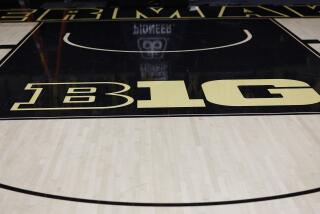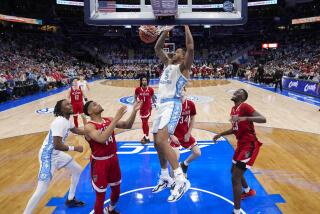McGuire made NCAA stage rise to high theater
- Share via
In one way or another, we are all carbon copies. Except Al McGuire. He was one of a kind. Rick Majerus calls him “an original original.”
Thirty years ago this Final Four weekend, in the same city where the semifinals will be played today, the son of a saloon keeper from Rockaway Beach, N.Y., said goodbye to the college basketball world as only Al McGuire could. He won an NCAA title he had no business winning.
Marquette’s motley crew of street-smart tough guys, overmatched and overrated, beat none other than the venerable Dean Smith and North Carolina in the final in Atlanta’s Omni.
Usually, the loser leaves crying. This time, it was McGuire’s tears that became so memorable.
Kevin Byrne, a senior vice president of the Baltimore Ravens, was Marquette’s sports information director then. Thirty years later, that night remains vivid.
“The classic shot was the cameras zooming in on Al in the last minute, sobbing on the bench,” Byrne says.
When the game ended, Byrne tried to get to McGuire because NBC wanted him for a quick interview. But McGuire took off for the locker room, hordes of press hot on his heels. He never looked back, and the door closed before even Byrne could get in. Eventually, he did.
“He was literally bawling, like a kid,” Byrne says. “His chest was heaving, he had a towel over his face. Here was this great man, pacing back and forth, crying.
“Finally, he stops and looks at me and he says, ‘Kevin, it’s not often a kid from the streets touches the silk.’ ”
That was McGuire. Part Socrates and part pool-hall hustler. If he were alive today, he’d play rap music on his iPod at the opera.
He loved every kid he recruited from the slums of New York City or the playgrounds of Milwaukee. But it didn’t always look like love.
Majerus has gone on to fame and fortune in the coaching ranks and took his own team, Utah, to the 1998 NCAA final. In 1977, he was the No. 2 assistant on that Marquette title team and saw it all from the inside.
“The first game of the tournament, we play Cincinnati and we are behind at the half,” Majerus says. “In the locker room, Al and Bernard Toone [a top reserve] start yelling and throwing punches at each other.
“So I grab Bernard, haul him outside into the hall and wrap my arms around him so he can’t move. People are walking by, looking at us, so I say, ‘We’re just stretching here.’ ”
When McGuire died in 2001, at 72, his legacy had long been romanticized. But Majerus says it would have been different without that ’77 NCAA title.
“If he hadn’t won, he’d have had a sadder afterlife,” Majerus says. “It validated him, his career. When he won, he didn’t cry out of happiness. He cried out of relief.”
The easiest thing about the run to the title was the title game. Smith, legendary for coaching tactics, went to his four-corners offense in the second half. Most other opponents tried to play it, disrupt it. Marquette stood there and waited out North Carolina.
“We were tired,” McGuire said afterward. “Dean let us rest.”
McGuire had taken his Warriors to the 1974 final but lost that one to North Carolina State. And before the 1976-77 season, he announced this would be his last go-around.
His team responded with such an uneven season that it barely got into the tournament, a 32-team affair then, and after his ruckus with Toone, Marquette got past Kansas State by a point in the next game. Late in that game, McGuire was called for a technical foul when a referee saw him gesturing with his hand on his throat.
Afterward, McGuire met the press and launched into a tirade against the NCAA that remains a classic in the genre of Tom Lasorda’s being asked what he thought of Dave Kingman’s performance.
McGuire asked the press if he could just talk, rather than answering questions, and soon it was Bob Knight without flying chairs.
It went on for at least 10 minutes and was keynoted, at full volume, by, “I’ve got to come up here with the NCAA pulling this crap? And that’s what it is ... That’s a competent official. He wouldn’t be here if he wasn’t competent. And someone brainwashed him. And they’ve been brainwashed before. And that’s the reason I wouldn’t coach anymore in the NCAA. It’s been a zoo.”
After he had picked Dean Smith’s pocket, and after he had stiffed NBC -- making him a lifetime hero of every working newspaperman there that night -- he was cajoled back onto the floor for the trophy presentation. When that ended, he noticed an old friend making his way down toward the floor, and with Majerus nearby, McGuire went to greet his friend and hug him.
“The guy kept asking Al if he knew what this meant,” Majerus says, “and finally Al says, ‘Sure, Norman. It means 10 years of high-paid speaking engagements.’ ”
Later, Byrne found McGuire, standing in the rain near the door of the team bus, waiting, still emotional.
“This will be my last chance to sit in the front of the bus,” McGuire told Byrne.
After coaching, McGuire had a prestigious career as a network broadcaster, and he left such an impression on Dick Enberg that Enberg wrote a one-man play, “McGuire.”
It will be performed three times in Atlanta this weekend, and the star is Cotter Smith, whose mandate it is to re-create one of sports’ all-time characters.
No matter how good Smith is, he will fail. You can’t re-create Al McGuire. There was only one.
*
Bill Dwyre can be reached at [email protected].



